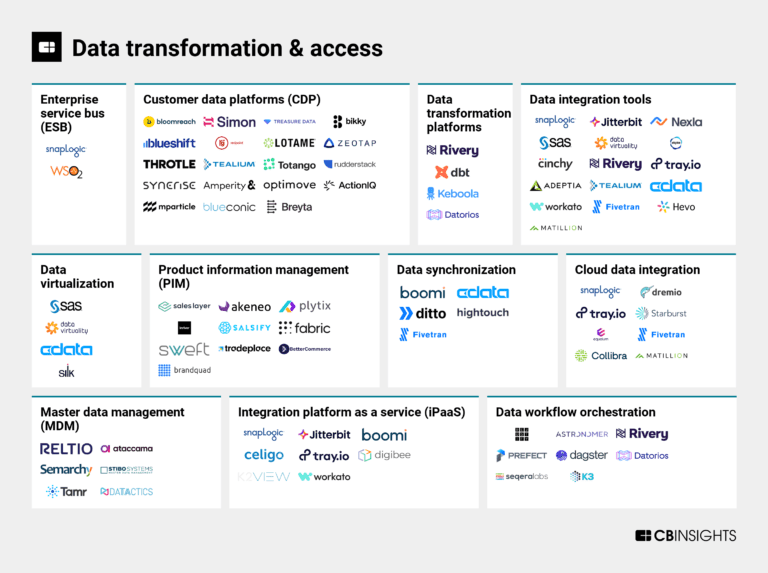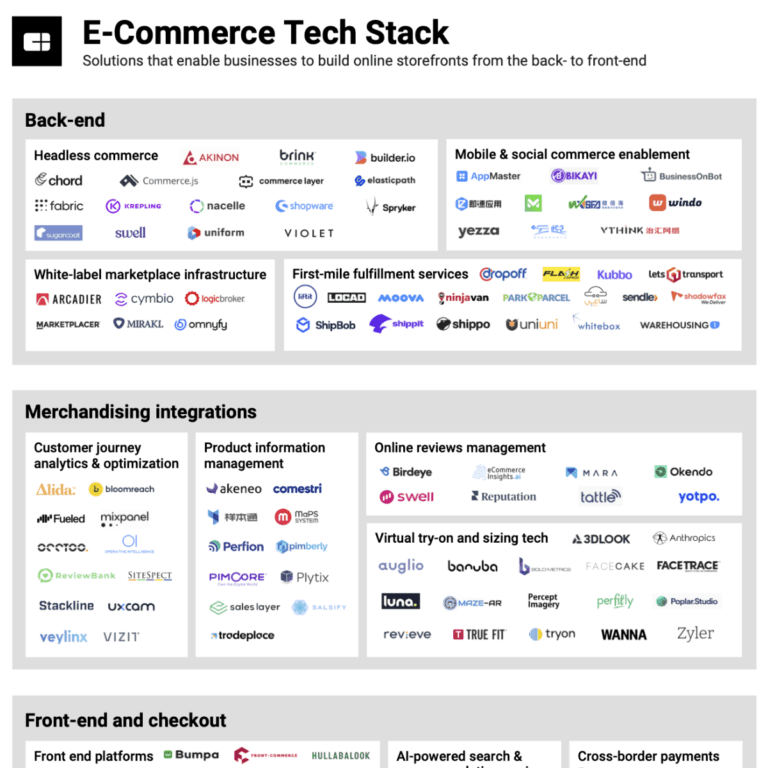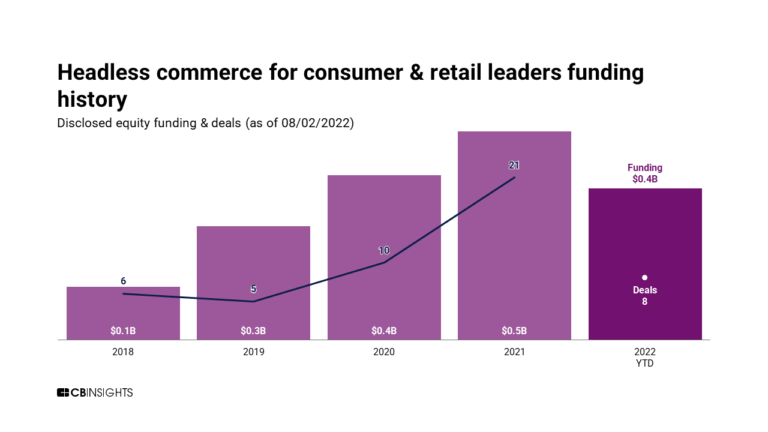
Fabric
Founded Year
2017Stage
Convertible Note | AliveTotal Raised
$297.38MLast Raised
$4.8M | 3 yrs agoMosaic Score The Mosaic Score is an algorithm that measures the overall financial health and market potential of private companies.
-55 points in the past 30 days
About Fabric
Fabric offers a commerce platform specializing in order management systems for the retail industry. It offers solutions that manages omnichannel fulfillment, real-time inventory, and order fulfillment. Fabric serves the retail sector, providing tools to improve customer experience and operational processes. It was formerly known as Yotta Digital Ventures. It was founded in 2017 and is based in Seattle, Washington.
Loading...
ESPs containing Fabric
The ESP matrix leverages data and analyst insight to identify and rank leading companies in a given technology landscape.
The headless commerce market provides an e-commerce architecture that separates the front-end presentation layer from the back-end commerce functionality. Providers of this API-led structure also typically use a cloud-native approach. A form of this structure, known as composable commerce, includes highly customizable and interchangeable plug-ins. This set up facilitates flexible shopper experienc…
Fabric named as Challenger among 15 other companies, including Shopify, BigCommerce, and commercetools.
Loading...
Research containing Fabric
Get data-driven expert analysis from the CB Insights Intelligence Unit.
CB Insights Intelligence Analysts have mentioned Fabric in 3 CB Insights research briefs, most recently on Aug 4, 2023.

Aug 4, 2023
The data transformation & access market mapExpert Collections containing Fabric
Expert Collections are analyst-curated lists that highlight the companies you need to know in the most important technology spaces.
Fabric is included in 4 Expert Collections, including E-Commerce.
E-Commerce
11,557 items
Companies that sell goods online (B2C), or enable the selling of goods online via tech solutions (B2B).
Unicorns- Billion Dollar Startups
1,277 items
Retail Tech 100
200 items
The most promising B2B tech startups transforming the retail industry.
NRF Big Show 2025: Exhibitors
959 items
Latest Fabric News
Feb 19, 2025
Artificial intelligence (AI) isn’t just another trend; it’s a transformative technology with near-universal appeal due to its extensive impact. In fact, 92 percent of businesses planned to invest in AI-powered software last year. Additionally, the number of AI products released in 2023 doubled that of prior years, according to Gartner. Retailers are no different in their eagerness for AI. Order Management Challenges Disrupt Retail Performance Retailers are reporting demand and fulfillment challenges, including financial strain due to excess stock, inefficiencies caused by inaccurate tracking, and stockouts from inaccurate or missing product information. These issues lead to missed sales and operational disruptions, directly impacting revenue and profits. Moreover, these issues create bigger challenges for retailers, such as: Customer dissatisfaction: Delays, stockouts, and inadequate or inaccurate product information frustrate consumers, resulting in lost sales and weakened brand loyalty. Operational inefficiency: Inaccurate tracking and manual errors lead to stockouts or overstock, disrupting business operations and increasing costs. Commerce channel challenges: Poor search engine optimization, site search performance, and shopping feed data impede product discovery, lower conversation rates, and increase order returns. While retailers have historically struggled with disconnected systems for order management and product information, a new approach has emerged via AI-powered order orchestration that brings these capabilities together in a unified, highly effective solution. And at its heart is an intelligent AI assistant that works alongside retail IT teams to enhance operations across: real-time inventory optimization; order management and fulfillment; and channel management and expansion. Instead of spending months setting up new social commerce integrations, retailers can now deploy in days while maintaining consistent product content across all platforms. This rapid deployment is powered by intelligent workflows that allow small teams to efficiently manage complex operations like optimizing product content, allocating inventory, optimizing fulfillment, and more. By dynamically optimizing fulfillment capacity based on real-time data, retailers can efficiently allocate resources to meet fluctuating demand without overextending their operations. Combined with easier order tracking and consistent and accurate product information across all touchpoints, customers get a seamless shopping experience that keeps them coming back. The result is a virtuous cycle where operational excellence directly translates into customer loyalty. Order orchestration delivers an AI-powered solution that scales seamlessly across omnichannel operations. It allows for easier and more effective discovery of products optimized for search engines, helping to drive conversion together with real-time monitoring, smart exception alerts, and dynamic capacity optimization to ensure efficient, flexible fulfillment. Benefits include: Enhanced demand generation: Retailers can improve omnichannel shopping experiences with AI-enriched product information connected to real-time inventory to enhance product discovery, SEO and site search, helping to boost conversion. Moreover, automated categorization mapping assigns newly imported or created products to the appropriate category. Intelligent fulfillment optimization: With smart order fulfillment, retailers can automatically evaluate inventory levels, carrier capacity, and delivery promises across locations to eliminate manual tradeoffs between speed and cost. With analytics-driven insights, AI recommends new fulfillment rules and automates decisions, helping retailers meet service levels while reducing shipping costs and split shipments. This approach ensures that orders are fulfilled from the most optimal location, streamlining operations and enhancing the customer experience. Seamless channel management: Retailers can capture revenue faster by launching and iterating channels in days vs. months to increase conversion through consistent and rich product content. Small teams can scale efficiently using intelligent workflows, minimize poor customer experiences from overselling and cancellations with real-time inventory, and reduce product detail page (PDP) abandonment with real-time availability and product content. DTC excellence: Reducing reliance on marketplaces and third parties increases margins. AI-powered OMS helps retailers quickly test and scale new markets, and then increase customer lifetime value with better shopping experiences from rich product descriptions and intelligent inventory allocations. Retailers can also enable reliable and faster fulfillment and free up working capital with optimized inventory availability. The adoption of AI in retail is accelerating as more use cases emerge and the potential value becomes clear. With a reimagined order orchestration, retailers can harness AI’s power through an integrated solution that combines intelligent order management with rich product content capabilities. Mustafa Masud is the director of product management for fabric , the creator of the next-generation order orchestration solution.
Fabric Frequently Asked Questions (FAQ)
When was Fabric founded?
Fabric was founded in 2017.
Where is Fabric's headquarters?
Fabric's headquarters is located at 113 Cherry Street, Seattle.
What is Fabric's latest funding round?
Fabric's latest funding round is Convertible Note.
How much did Fabric raise?
Fabric raised a total of $297.38M.
Who are the investors of Fabric?
Investors of Fabric include Eniac Ventures, Redpoint Ventures, Norwest Venture Partners, Stripes Group, Forerunner Ventures and 9 more.
Who are Fabric's competitors?
Competitors of Fabric include Chord, Amplience, Orderbot, Storyblok, Elastic Path and 7 more.
Loading...
Compare Fabric to Competitors

commercetools specializes in composable commerce and provides enterprise-grade commerce solutions. The company offers a cloud-native platform that enables businesses to create scalable and customizable digital commerce experiences. commercetools primarily serves sectors such as retail, fashion, food and grocery, telecom, automotive, and healthcare. It was founded in 2006 and is based in Munich, Germany. commercetools operates as a subsidiary of REWE Group.

Contentful provides a composable content platform within the digital content and experience management industry. The company offers a suite of products that enable organizations to create, manage, and deliver digital content across various channels. Contentful's solutions cater to a range of use cases, including global marketing, e-commerce, support portals, and mobile applications. It was founded in 2013 and is based in Berlin, Germany.

Contentstack specializes in providing a headless, content management system designed for modern digital experiences across various channels. The company offers a platform that enables the creation, management, and delivery of content to multiple platforms and devices. Contentstack's solutions cater to diverse industries, including retail, travel and tourism, financial services, and technology, with use cases such as e-commerce, localization, and personalization. It was founded in 2018 and is based in San Francisco, California.

Storyblok is a headless content management system (CMS) that provides a visual editor for content creation, an API-first approach for integration, and a component-based architecture for content delivery. Storyblok serves enterprises, developers, and marketers focused on their content management processes. It was founded in 2017 and is based in Linz, Austria.

Swell is an API-first e-commerce platform that provides online shopping capabilities across various business sectors. The platform includes headless storefronts, checkouts, and multi-store management, allowing businesses to manage their e-commerce operations. Swell serves sectors such as direct-to-consumer, subscriptions, B2B wholesale, and marketplaces. It was founded in 2016 and is based in Denver, Colorado.

BetterCommerce is a B2B commerce platform that focuses on sales and customer experiences within the trade sector. The company provides services including a commerce engine, product information and order management systems, content management, AI-based recommendations, and analytics to support integration and decision-making. BetterCommerce serves wholesalers, manufacturers, distributors, and brands seeking to expand into consumer sales channels. It was founded in 2015 and is based in London, England.
Loading...


